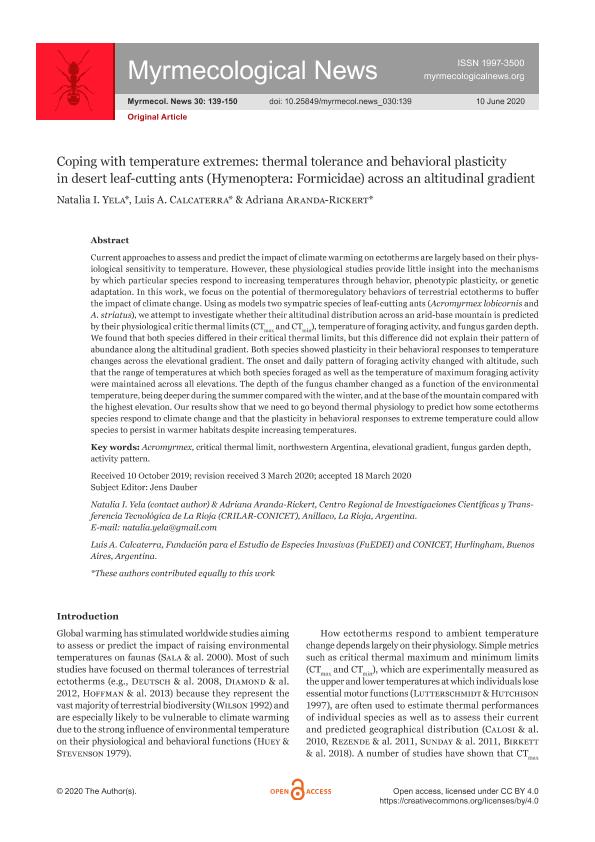Mostrar el registro sencillo del ítem
dc.contributor.author
Yela, Natalia Ines

dc.contributor.author
Calcaterra, Luis Alberto

dc.contributor.author
Aranda Rickert, Adriana Marina

dc.date.available
2021-10-15T00:39:02Z
dc.date.issued
2020-06-10
dc.identifier.citation
Yela, Natalia Ines; Calcaterra, Luis Alberto; Aranda Rickert, Adriana Marina; Coping with temperature extremes: thermal tolerance and behavioral plasticity in desert leaf-cutting ants (Hymeno ptera: Formicidae) across an altitudinal gradient; Oesterreichische Gesell Entomofaunistik; Myrmecological News; 30; 10-6-2020; 139-150
dc.identifier.issn
1994-4136
dc.identifier.uri
http://hdl.handle.net/11336/143712
dc.description.abstract
Current approaches to assess and predict the impact of climate warming on ectotherms are largely based on their physiological sensitivity to temperature. However, these physiological studies provide little insight into the mechanisms by which particular species respond to increasing temperatures through behavior, phenotypic plasticity, or genetic adaptation. In this work, we focus on the potential of thermoregulatory behaviors of terrestrial ectotherms to buffer the impact of climate change. Using as models two sympatric species of leaf-cutting ants (Acromyrmex lobicornis and A. striatus), we attempt to investigate whether their altitudinal distribution across an arid-base mountain is predicted by their physiological critic thermal limits (CTmax and CTmin), temperature of foraging activity, and fungus garden depth. We found that both species differed in their critical thermal limits, but this difference did not explain their pattern of abundance along the altitudinal gradient. Both species showed plasticity in their behavioral responses to temperature changes across the elevational gradient. The onset and daily pattern of foraging activity changed with altitude, such that the range of temperatures at which both species foraged as well as the temperature of maximum foraging activity were maintained across all elevations. The depth of the fungus chamber changed as a function of the environmental temperature, being deeper during the summer compared with the winter, and at the base of the mountain compared with the highest elevation. Our results show that we need to go beyond thermal physiology to predict how some ectotherms species respond to climate change and that the plasticity in behavioral responses to extreme temperature could allow species to persist in warmer habitats despite increasing temperatures.
dc.format
application/pdf
dc.language.iso
eng
dc.publisher
Oesterreichische Gesell Entomofaunistik

dc.rights
info:eu-repo/semantics/openAccess
dc.rights.uri
https://creativecommons.org/licenses/by-nc-sa/2.5/ar/
dc.subject
ACROMYRMEX
dc.subject
CRITICAL THERMAL LIMIT
dc.subject
NORTHWESTERN ARGENTINA
dc.subject
ELEVATIONAL GRADIENT
dc.subject
FUNGUS GARDEN DEPTH
dc.subject
ACTIVITY PATTER
dc.subject.classification
Ecología

dc.subject.classification
Ciencias Biológicas

dc.subject.classification
CIENCIAS NATURALES Y EXACTAS

dc.title
Coping with temperature extremes: thermal tolerance and behavioral plasticity in desert leaf-cutting ants (Hymeno ptera: Formicidae) across an altitudinal gradient
dc.type
info:eu-repo/semantics/article
dc.type
info:ar-repo/semantics/artículo
dc.type
info:eu-repo/semantics/publishedVersion
dc.date.updated
2021-09-07T19:58:30Z
dc.journal.volume
30
dc.journal.pagination
139-150
dc.journal.pais
Austria

dc.journal.ciudad
Viena
dc.description.fil
Fil: Yela, Natalia Ines. Consejo Nacional de Investigaciones Científicas y Técnicas. Centro Regional de Investigaciones Científicas y Transferencia Tecnológica de La Rioja. - Universidad Nacional de La Rioja. Centro Regional de Investigaciones Científicas y Transferencia Tecnológica de La Rioja. - Universidad Nacional de Catamarca. Centro Regional de Investigaciones Científicas y Transferencia Tecnológica de La Rioja. - Secretaría de Industria y Minería. Servicio Geológico Minero Argentino. Centro Regional de Investigaciones Científicas y Transferencia Tecnológica de La Rioja. - Provincia de La Rioja. Centro Regional de Investigaciones Científicas y Transferencia Tecnológica de La Rioja; Argentina
dc.description.fil
Fil: Calcaterra, Luis Alberto. Fundación para el Estudio de Especies Invasivas; Argentina. Consejo Nacional de Investigaciones Científicas y Técnicas; Argentina
dc.description.fil
Fil: Aranda Rickert, Adriana Marina. Consejo Nacional de Investigaciones Científicas y Técnicas. Centro Regional de Investigaciones Científicas y Transferencia Tecnológica de La Rioja. - Universidad Nacional de La Rioja. Centro Regional de Investigaciones Científicas y Transferencia Tecnológica de La Rioja. - Universidad Nacional de Catamarca. Centro Regional de Investigaciones Científicas y Transferencia Tecnológica de La Rioja. - Secretaría de Industria y Minería. Servicio Geológico Minero Argentino. Centro Regional de Investigaciones Científicas y Transferencia Tecnológica de La Rioja. - Provincia de La Rioja. Centro Regional de Investigaciones Científicas y Transferencia Tecnológica de La Rioja; Argentina
dc.journal.title
Myrmecological News

dc.relation.alternativeid
info:eu-repo/semantics/altIdentifier/doi/http://dx.doi.org/10.25849/myrmecol.news_030:139
dc.relation.alternativeid
info:eu-repo/semantics/altIdentifier/url/https://myrmecologicalnews.org/cms/index.php?option=com_content&view=category&id=1564&Itemid=435
Archivos asociados
